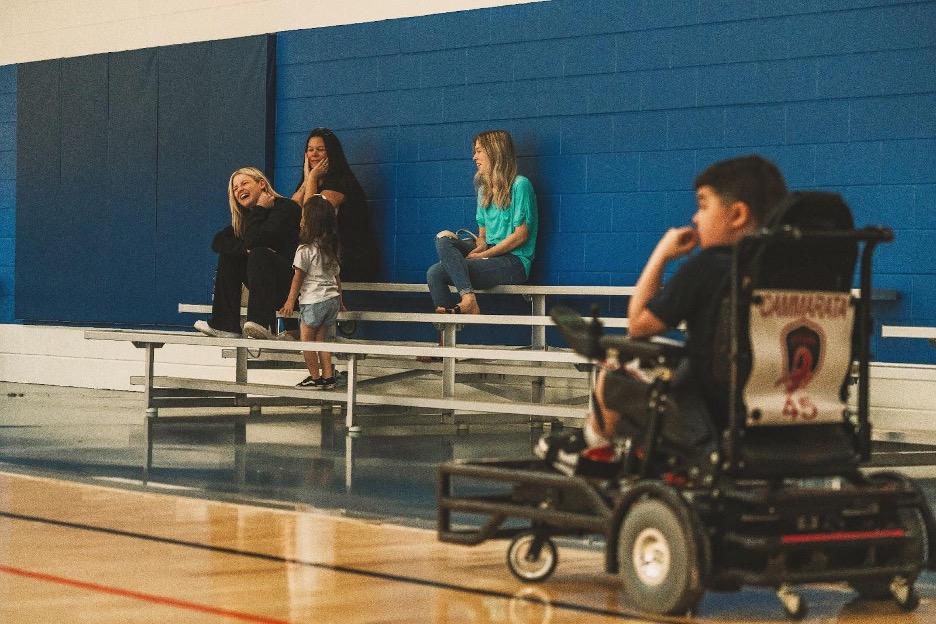Stories of Duchenne
Beck
Living with Duchenne Muscular Dystrophy
Winder, GA | Born June 2010
I don’t let Duchenne define me.

Beck presses down the gas pedal and steers his side-by-side on a path through the woods near his house. Stanley, his stepdad, follows closely in his own 4WD vehicle, a larger version of Beck’s, bumping over tree roots and rocks with ease. Beck’s eyes are shielded by a pair of wraparound sunglasses that reflect the afternoon sun as he pulls back onto the pavement and heads for home. His hands knowingly grip the steering wheel as he turns into the driveway.
At 13 years old, Beck has a profound desire to pilot speedy and unique vehicles in all sorts of terrain. He really loves his side-by-sides. “They are so fun to drive around,” he says. “I can take them off-roading.” Unlike ATVs, the side-by-side comes equipped with safety systems such as a roll cage, harnesses, and an advanced four-wheel suspension. Beck crashed an ATV when he was younger and that is something he does not want to repeat.
Stanley pulls up behind Beck in the driveway and looks defeated. He looks down toward a flat tire. He adds it to the list of things to fix. However, maintenance and tinkering are truly things he enjoys, and one of several ways he connects with his stepson, who lives with Duchenne muscular dystrophy (Duchenne). The disorder weakens and depletes Beck’s muscles, which has impacted his ability to walk, but behind the wheel these days, you’d never know anything was slowing him down.
“He used to only be riding for 10 minutes before his arms would start hurting,” says Stanley. “That’s not long enough… He’d be on the thing all day if it was up to him.” Stanley’s background in custom cars and motorcycles led him to a solution. “I found an electric power-steering kit,” he explains. He retrofitted the unit for the side-by-side, and now Beck is able to steer with much less effort.
“Stanley, my step-dad, came into my life with Duchenne,” says Beck. “And he wanted to be doing stuff for me. He’s doing a lot.” Beck was diagnosed at the age of five, and in the past several years his family’s world has changed in many ways—one of the positives has certainly been the addition of Stanley.
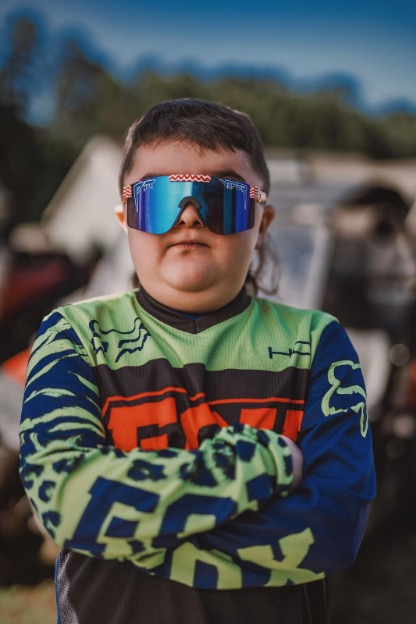
Brandi, Beck’s mother, and Stanley first met at the racetrack where she worked. “My family was very involved in motorsports,” says Brandi. “My grandma raced a car until she was 65.” When she and Stanley first started dating, Brandi tried to warn him about what he was getting into. “I told him, you don’t want this life.” She was being real with him. The single mom of three ran at an exhausting pace, working nights and weekends so that she could take Beck to therapy and doctors’ appointments during the week, including flying weekly out of state to some clinic visits.
Brandi brought Stanley to one of Beck’s appointments at the hospital to show him what it was all about. “I had never fully been around someone with disabilities before,” says Stanley. He was only beginning to understand the challenges in Brandi’s family, but when he got to know Beck, the deal was sealed and his decision solid. “There was nothing more that I wanted than to be in this family,” he says.
Bringing Stanley into Beck’s world has added another dynamic element to his support system which is heavily made up of family. Brandi along with Destiny and Lauren, his two older sisters, and Aspyn, his younger sister, have been there for him since day one, before and after his diagnosis. They are young adults now, and help Beck each day with daily living activities such as brushing his teeth and taking him to doctors appointments—alleviating the pressure on Brandi.
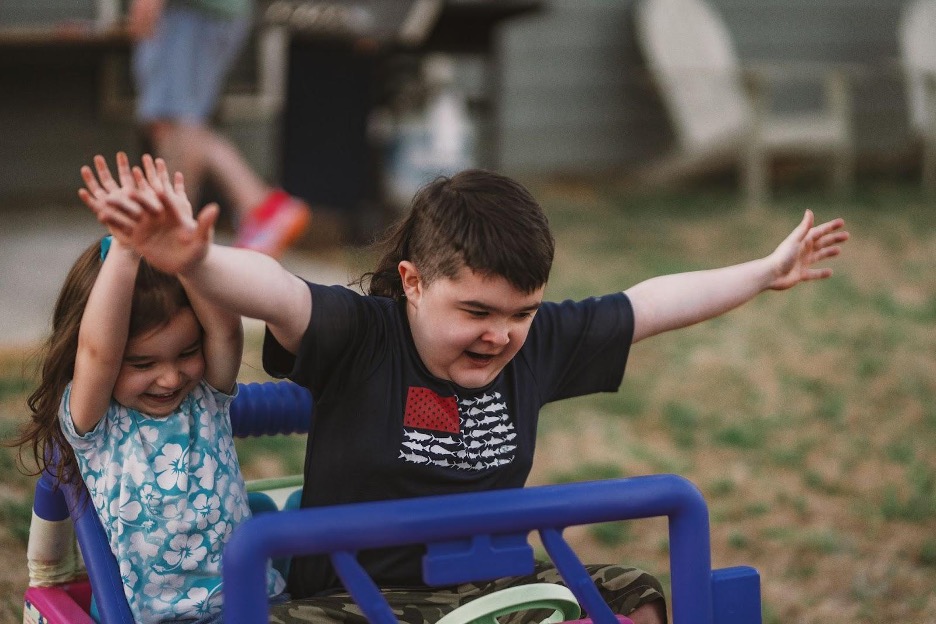
Beck’s sisters mean a lot to him, and likewise they adore him. Destiny and Lauren’s relationships to him are loving but not simple or easy. They both are still figuring out what it means to support Beck and still have an authentic sibling relationship. “It does change the family dynamic, because most everything is focused on Beck,” says Destiny. “It has to be.” While she found this challenging at times, she has moved past feelings of frustration as she has matured. Even so, her and Lauren must deal with the anticipatory grief that comes with a Duchenne diagnosis, and the condition’s fatal nature.
Furthermore, they have both learned they are carriers of the x-linked gene that causes Duchenne. “I always wanted to have children,” says Lauren. “Now, I have to think about it differently. If I have a boy, there will be a 50% chance he has Duchenne.” She and Destiny both advocate ardently for siblings in the Duchenne community to seek counseling and get support with the complex issues that the diagnosis creates.
Ten years before giving birth to Beck, Brandi had Destiny and Lauren at 18 and 19 years old, and navigated the challenges of being a young mother building a strong sense of self-reliance. “We’re all very close. It’s really helped guide me throughout my journey since I was 18… We grew up together,” says Brandi. Destiny and Lauren both still live at home, in their community on the rural outskirts of Atlanta, GA.
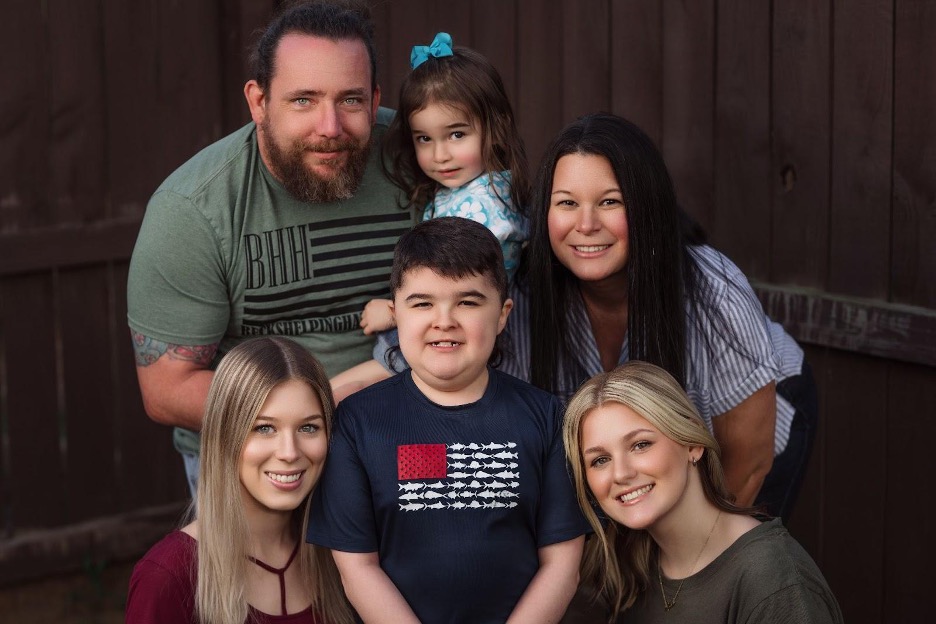
Looking back, before Beck’s diagnosis, Brandi sees clear signs that something was going on, but at the time, living as a busy single mom, she hardly noticed anything was off. Yes, he was slower on the soccer field, and seemed to tire before his peers—but it wasn’t until 2015 that a fall led to serious fact-finding. On a family trip, after a long day of walking, Beck fell over and complained that his legs wouldn’t work.
Soon after, Beck’s pediatrician noticed the Gower’s sign – in order to stand from sitting on the floor, Beck needed to use his hands to push himself up from his shins, knees, and thighs. Even though the doctor had never had a patient with Duchenne before, she recognized an early sign of the disease. Prior to sharing any of this with Brandi, she ordered blood tests.
The tests revealed that Beck had very high creatine kinase levels—a measure of muscle breakdown, and a clinical tool to diagnose Duchenne. Brandi rushed to get Beck in with a neurologist as soon as possible right before Christmas. The definitive diagnosis came two weeks later in January 2016.
Destiny remembers the diagnosis day well. “My heart sank,” she says. “The week prior in my health class in high school I watched a video of a boy with Duchenne who was on life support. That was my first introduction to it. I was like, ‘Oh my gosh, my brother has that now!’”
For Brandi, depression took hold for the first few weeks following the diagnosis, but she soon saw the way forward. It would not be easy, but she became determined to help Beck live the longest, most-fulfilling life possible.
“I don’t let Duchenne define me,” says Beck. “At the same time, I’ve had to accept that I have to limit what I do.” Brandi has always been very open with Beck about his diagnosis, and now that he is entering his adolescence, the disease is starting to impact his life in more noticeable ways. “He has googled Duchenne,” says Brandi. “Now that he’s older, he’s asking more questions.”
Beck is entering a transition phase of how others perceive him. “At school I use my power chair,” explains Beck, “but I can still walk.” Therapy and medication have helped him remain ambulatory as he heads into his teenage years. He began taking corticosteroids after his diagnosis, and has gotten on exon-skipping medication, specific for his mutation.
Beck’s focus now is on conserving his muscles, in hopes they will last longer. “I tell others [with Duchenne] to make sure not to walk big hills or run too much,” he says. “Try to conserve your energy. Don’t go jumping on a trampoline or anything like that.”
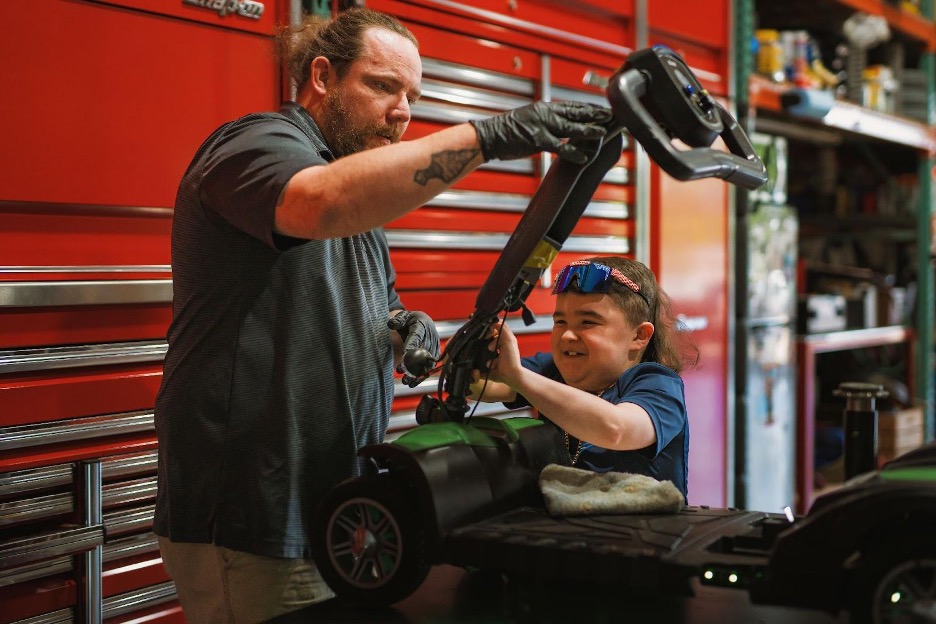
But beyond his own struggle, he and his family are also committed to helping others. During COVID, with everyone at home, Brandi and Stanley concocted an idea. “He’s got the want in him to always be a helper,” says Stanley. “We were sitting around talking one day about the things that we struggle with or the things other families struggle with.” Accessibility and access to equipment were clearly a need. With Stanley’s handy skills, Brandi’s organizational knowledge, and Beck’s enthusiasm, the family started Beck’s Helping Hands, a nonprofit dedicated to helping Duchenne families with accessibility equipment and support. “It’s been therapeutic for me—helping others,” relays Brandi. “I know the struggle that there is for those with disabilities.”
Furthermore, Stanley and Beck work together to customize their loaner scooters and chairs. “We’ll do custom wraps,” says Stanley. “We’ll lower the seat on the scooters so their legs aren’t dangling. We’ll put neon lights underneath, or cool stickers.”
Beck and Stanley enter the shop later in the afternoon. Together they inspect new equipment and stain furniture—a side-business for Brandi and Stanley. “Beck could build you a house,” says Brandi. From an early age, he learned construction skills and has worked on several building projects.
The garage doubles as a home base for the Atlanta Sting Academy, a power-wheelchair soccer team that Beck is proud to represent. “Two years ago, I wanted to be able to do a sport,” says Beck. His friends, others he met with Duchenne, prodded him to join the team. Beck’s early hesitations gave way to his competitive spirit, and he started with the team in 2021.
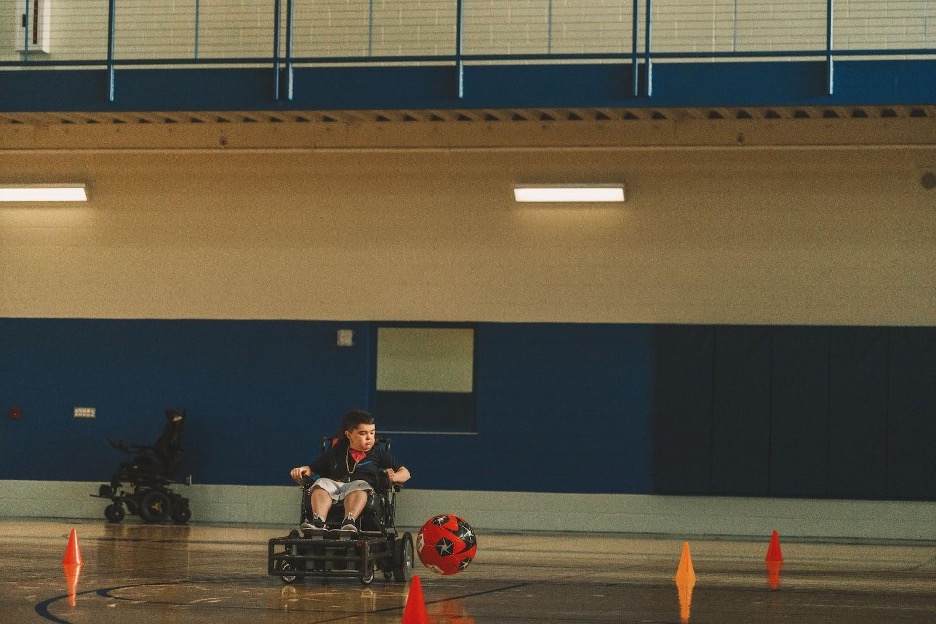
Rubber wheels squeak on the polished basketball court as the Sting Academy warms up, passing the ball to one another. With swift moves of a small joystick, Beck’s wheelchair whirls around and makes contact with the large red and black ball, sending it careening across the gym. The spin-kick is the most powerful move in power soccer, and not easy, but Beck and his teammates deliver the ball with consistent accuracy.
Stanley stands tall at the other end of the court directing the passing drill rotation on the floor. Once Beck got involved, Stanley studied the sport and now helps coach the team. Coaching power-soccer has helped Stanley further develop an understanding of disability. Beck gets that look of focus again as he steers his chair into position again and again, trying to make each move fluid and fast.
“He’s very competitive,” says Stanley. “Beck’s got that heart in him. If there is anyone to make it a competition and do his best, he is going to figure out a way to do it, no matter what. Even with Duchenne. He wants to get the best walk numbers. He wants to get the best breaths.”
From the sideline, the rest of the family watches and talks amongst themselves. Going to Beck’s practices opens up room in their busy lives to just be together. And while Beck and his teammates begin to sync their moves on the court, Beck’s family finds their own rhythm, not the easiest to follow, but one that allows them to spend quality time together, because to them family is everything.

